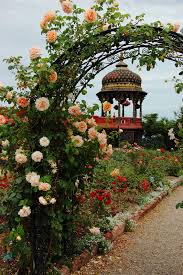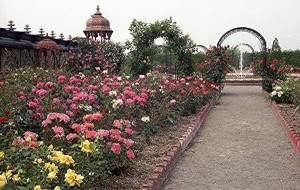New Vrindaban’s Palace Rose Garden Decides to Switch to Sustainability
Prabhupada’s Palace Rose Garden Making the Switch to Sustainability
by Lilasuka dasi
Prabhupada’s Palace of Gold at New Vrindaban didn’t always have the stunning, bursting-with-color rose garden that every visitor now gets to enjoy. Twenty-six years ago, in 1988, Betty Hickey, a horticulturalist, and a good neighbor of New Vrindaban, from a nearby farm, and someone who appreciated the devotees, had the idea to establish the rose garden for the Palace. So she created and even maintained it herself, with the devotees’ blessings and help.
Even before internet days, she extensively researched the care of roses, and soon became a skilled rosarian.
Since Betty retired in 2012, a seasoned gardener Vaisnavi, Gopalasyapriya dasi is taking the responsibility for the garden, with some great helpers. Mukunda dasi cuts down and mulches the garden in the fall; Purnima dasi, Gopa’s main helper, works at the garden all summer; Srimati helps occasionally, along with Krsna Lila, Mukunda’s daughter. Gopa herself has done most of the spraying, fertilizing, green house planting and organizing. Tripad vibhuti das has been managing and overseeing the whole Palace of Gold project for 20 years now .
Switch to another scene for a minute. About the same time that Betty was establishing the Palace’s magnificent rose garden, back in the late ‘80’s, a man named Paul Zimmerman, in another part of the country, wanted to do something new in his life, so he got into gardening, specifically with roses. Soon, Paul started a “rose care” company in California where he mostly took care of other people’s gardens.
Thus began Paul’s journey of sustainable rose care, and his current connection with New Vrindaban and Prabhupada’s Palace Rose Garden.
Paul claims: “The common perception amongst gardeners is that roses are fussy, and need lots of chemicals in order to thrive. Not true! We focused on a more natural, organic nursery for our roses. We knew that roses did not have to have all sorts of chemicals to be healthy and flourish.”
Paul feels that sustainability is now here to stay, and would be great for the Palace roses.
“Most of the harsh rose chemicals are now outlawed anyhow!”
Paul continues, “A lot of public rose gardens are getting the command from visitors that if they come to the garden, and they see that the rosarians are spraying with masks and gloves on, they just won’t visit.”
Paul is a consultant. He had great success in transforming the well-known Biltmore Gardens in Asheville, NC to organic, so we knew that he had credibility. (Read more about Paul’s work at: http://paulzimmermanroses.com/) Gopa is the liason for the Palace with Paul Zimmerman, who first came on April 1, 2014 and then for a second visit to see the progress and help them along on June 11, 2014.
Gopa expressed it this way, “We are switching to a more sustainable Palace rose garden for several reasons. We are hoping that the younger generation, who are very environmental-conscious, and largely anti-chemicals, will be attracted to carrying on the work after we older women can no longer do it. The rose garden is very much appreciated and most people understand how difficult it is to maintain. A chemically sprayed rose garden is also becoming more objectionable to the residents of the community.”
“Madhava Ghosh, who is involved with New Vrindaban’s ECOV board, helped to connect Paul with us. Paul found us through our past connection with the All American Rose Selection, who had provided us many awards in the ‘80’s, but is now defunct. ECOV is instrumental in financing this sustainable project,” Gopa continues.
Gopa feels it will be more work, “but it’s definitely worth a try. It’s becoming more difficult to even spray with chemicals because I’ve had to start wearing a mask. But this year, we won’t put down any herbicide. Instead, Paul recommended that we start with a thick, two inch layer of compost and heavy mulch on all the beds, and spraying with vinegar, which is much more natural. We will also need to simply remove some of the weaker brands of roses and replace them with more naturally bug-resistant rose strands.”
The Palace currently has about 800 plants total, of 150 different species.
Paul explained to Gopa, “The idea is to not necessarily be out there spraying whether there are diseases there or not, BUT to build the rose’s immune system so it can fight disease, just like humans.”
Paul is excited, “This Palace garden has “great bones”!!! It’s a good garden that can also be sustainable. We don’t need the chemicals. The more I learn about your community, the more I think that sustainability resonates with the people. I understand that your community is getting better at trying to waste less, and is working towards recycling. And your high spiritual philosophy includes taking care of the earth planet. You will certainly be able to use the Palace Rose Garden as a phenomenal educational opportunity.”
How long will it take to get the Palace roses sustainable?
“Well,” Paul explains, “At the Palace, you can’t do this “cold turkey” because you don’t have the luxury of being able to close down! Your guests have expectations that they want to see the rose garden whenever they come here. So, I say this would be a two to three year process. The first year: build your foundation. Then, the second and third years: change some elements in the garden, wean the roses and add some new plants that take a year or two to grow.”
Paul revealed another very exciting aspect of this whole sustainable rose project.
“Just think,” Paul declared, “When the garden goes sustainable, then all the rose petals will be organic and can be used for so many products, like rose petal jelly, rosehip tea, rose oil, rose water, and more. You can begin to make your own products and sell them. This rose garden can produce some income and advertisement for the community.”
Gopa is excited about the possibilities, “We want the Palace Rose Garden to become a more integral part of what we do here in the New Vrindavan community.”
The proof is in the seeing and smelling! Everyone is invited to come and visit Srila Prabhupada’s Palace of Gold Rose Garden, open all spring and summer until the last West Virginia frost.









